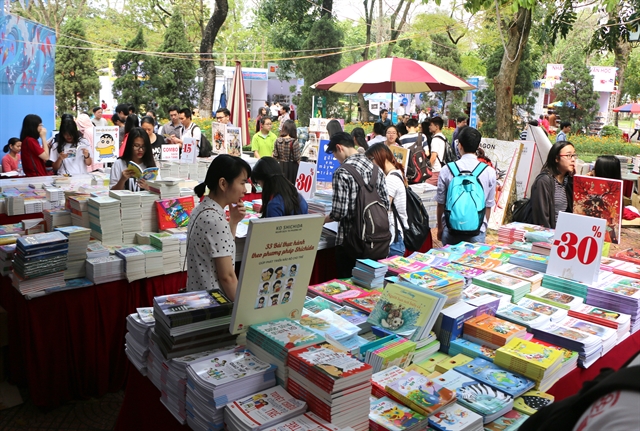 Society
Society


|
| Book fair at Thống Nhất (Unification) Park in Hà Nội. Various book fairs are organised throughout the year in Việt Nam as a chance for publishers to present new publications while readers can purchase the books at discounted prices. — VNS Photo Đoàn Tùng |
HÀ NỘI — Counterfeit books are causing publishers a major headache.
And despite authorities cracking down on illegal sellers, fake books are still on sale.
Staff from Vietnam News Agency recently took to the streets to find counterfeit books being sold.
Some shops around the areas famed for selling books in the capital were offering publications at heavily reduced prices.
In some cases, costs were marked up to 60 per cent lower than usual.
Most of the cheap deals were for reference books, literature, fiction and comics.
A student of the National Economics University said she still bought them in Hà Nội’s Đống Đa District because they were cheap.
Although the quality of paper and ink were poor, she said she still purchased them because as a student the prices were more suitable.
Counterfeit books are not only sold in shops but also online.
A quick web search discovered the entire Harry Potter collection was being sold for as little as VNĐ350,000 or US $15.
Figures show the authorities have seized more than half a million fake books since 2010 countrywide.
Chairman of the Member Council of Việt Nam Education Publishing House Nguyễn Đức Thái said books used in the classroom were copied the most.
Violators were found to usually choose English books because that type attracted more readers so it brought them higher profits, he said.
Director of Thái Hà Books Joint Stock Company Nguyễn Mạnh Hùng said there were many ways to produce counterfeit books. Violators could publish a book without copyright or share e-version of a book for free via the internet.
The inquiry by VNA discovered counterfeit books blatantly sold in many of Hà Nội’s ‘book streets’.
Similar violations were also found in HCM City.
Nguyễn Văn Phước, director of Trí Việt First News Publishing Co Ltd said manufacturing and selling counterfeit books would cause serious harm to publishing companies around the country.
Sophisticated tricks
Nguyễn Ngọc Bảo, deputy head of Department of Publishing, Printing and Distribution under the Ministry of Information and Communications said printing and distributing counterfeit books was a sophisticated process.
Many are printed and distributed quickly because of modern techniques with those responsible operating in the suburbs.
This also put the counterfeiters out of the spotlight from the authorities as well as many choosing to print in the evening and during weekends or holidays, when officials were not working, he said.
And, he added, in many cases this was a ‘family run business’ with relatives of counterfeiters being used to transport the books into town because they were more trustworthy.
In some cases, they were using a network of staff to market the product and approach book shops offering good deals.
Sanction not strong enough
Nguyễn Đăng Quang, former deputy director of the Việt Nam Education Publishing House said authorised agencies had dealt with numerous violations in the past.
“But the sanctions are not strong enough to deter violations,” he said.
Quang said the penalties were currently handled under the Decree 159/2013/NĐ-CP. Under the decree, although an individual or organisation illegally print thousands of counterfeit books, they would only receive a maximum fine of VNĐ30 million (US$1,288).
Bảo, deputy head of the Department of Publishing, Printing and Distribution pointed out another reason was that the number of inspection staff was very few in every locality.
Additionally, poor co-operation among authorised agencies including police, watchdogs, customs and publishing houses added to the problems, he added.
Solutions
Quang recommended agencies amend laws and regulations to increase fines to act as a stronger deterrent.
Lawyer Vũ Hồng Yến, of Rouse Legal Việt Nam Co Ltd, said Việt Nam was still on the list of countries that need to monitor the enforcement of intellectual property rights. The counterfeit books were still on the market because of limited public awareness of the copyrights.
Yến suggested those in power co-operate to raise the public awareness of the issue.
In response to the situation, Bảo said the agency would re-check and then compile a tighter set of rules to fix the situation.
Bảo added the department would raise co-operation to better deal with the violations in the future.
“Lastly, the most effective solution is believed that each reader should boycott counterfeit books to save both authentic books and the national publishing sector,” he said. —VNS




